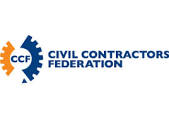The Confined Space Entry course offered by Civil Contractors Federation is designed to meet the requirements as set out in the OHS Regulations, Compliance Code of Practice, Australian Standards and Companies requirements.

Course Details
The Confined Space Entry course offered by Civil Contractors Federation is designed to meet the requirements as set out in the OHS Regulations, Compliance Code of Practice, Australian Standards and Companies requirements.
This course is also targeted at the individual requirements of the workgroup. The course is competency based on both theoretical and practical training entering a simulated Confined Space.
Nationally Accredited units of competency are:
RIIWHS202E – Enter and Work in Confined Spaces
MSMPER200 – Work in accordance with an Issued Permit
HLTAID009 – Provide cardiopulmonary resuscitation (CPR)
Topics Covered
The program consists of an initial induction course which includes CPR and covers the following topics:
Relevant legislation (Victorian WorkSafe Regulations, Current Compliant Codes and AS 2865).
Company policies and procedures.
Hazard identification, types of gases.
Entry permits, selection of appropriate safety equipment and lockout procedures.
Entry and exit procedures (crew sizes), lifelines, harnesses, winches, communication techniques.
The use of Gas detection equipment, when and where to test.
Self-rescue breathing apparatus.
Cardiopulmonary Resuscitation (CPR and AED).
Emergency and rescue procedures.
Practical exercise.
Who should attend?
This training course is designed for people who work in or around confined spaces.
What qualifications does this offer?
Course participants are issued with a Statement of Attainment and card listing the units of competency indicated on the card.
Student records for training are maintained on the Civil Contractors Federation Training database to enable monitoring and notification of any refresher training requirements.
Civil Train strongly advise that this course is completed in conjunction with Operate Breathing Apparatus PLUS Undertake Confined Space Rescue. View our available list of courses to read more about what this course offers and how to enrol.
Civil Train Fees, Charges and Refund Policy
Please ensure that you read the Civil Train Fees, Charges and Refund Policy and check the Terms and Conditions before enrolling in this course with Civil Train. If you have any questions about our Fees, Charges or Refunds/Cancellations Policy, please contact CCF Victoria on (03) 9588 7600.
About CCF Victoria
For 80 years, the Civil Contractors Federation–Victoria Branch has been the peak industry body representing and servicing the civil construction industry in this State. CCF members are responsible for the construction and maintenance of Australia’s infrastructure, including roads, bridges, pipelines, drainage, ports and utilities.
Our members also play a vital role in the residential and commercial building industry by providing earthmoving and land development services including the provision of power, water, communications and gas. CCF is an organisation registered under the Fair Work (Registered Organisations) Act 2009.
The organisation is governed by a National Board comprised of member-elected representatives from each state and territory in the Commonwealth.
Our full range of benefits and services include:
Specialised training for civil industry
Advocacy on key industry issues
Contractor Management Systems
Events & Networking
Civil Career Advice
OH&S Advice
Industry Publications and Resources
Environmental Management Advice
Legal and Industrial Relations Advice
Meet the CCF Victoria Team
The CCF Victoria Team is formed by the CCF Victoria Board and the Executive Team. The CCF Victoria Board is comprised of some Victoria’s most experienced and respected specialists in the Civil Construction Industry. And, the Executive Team is comprised of highly experienced professionals, each specialists in their respective areas, working together to the benefit of our Members and the industry at large.
© 2025 coursetakers.com All Rights Reserved. Terms and Conditions of use | Privacy Policy